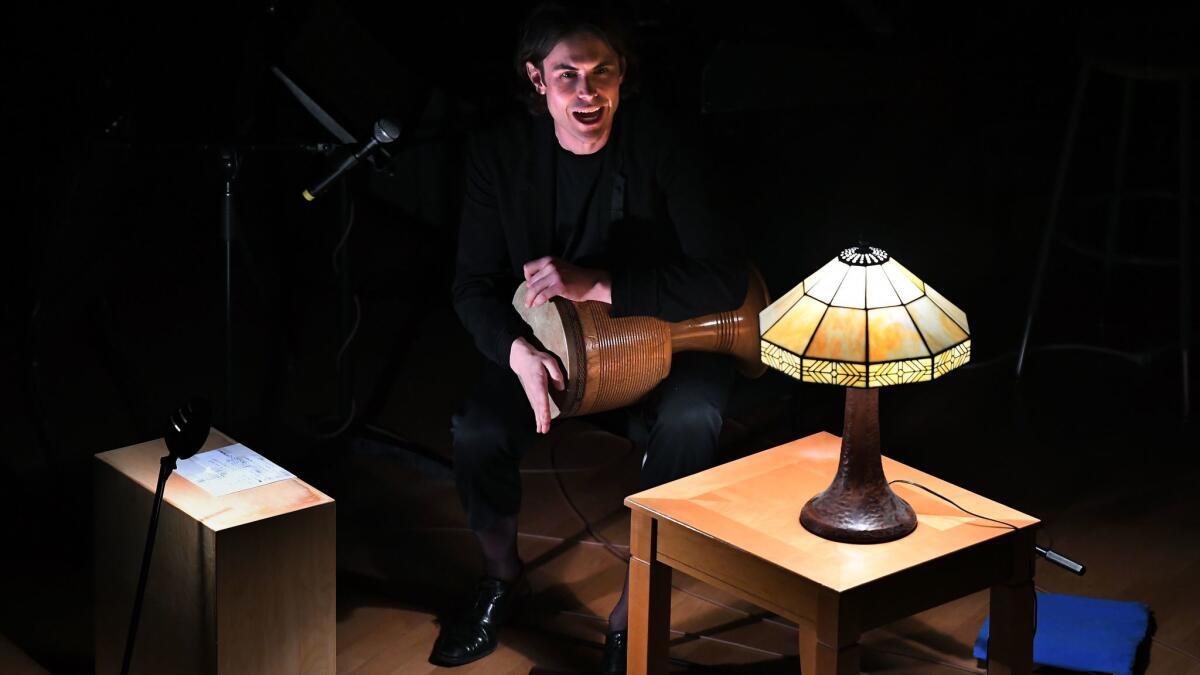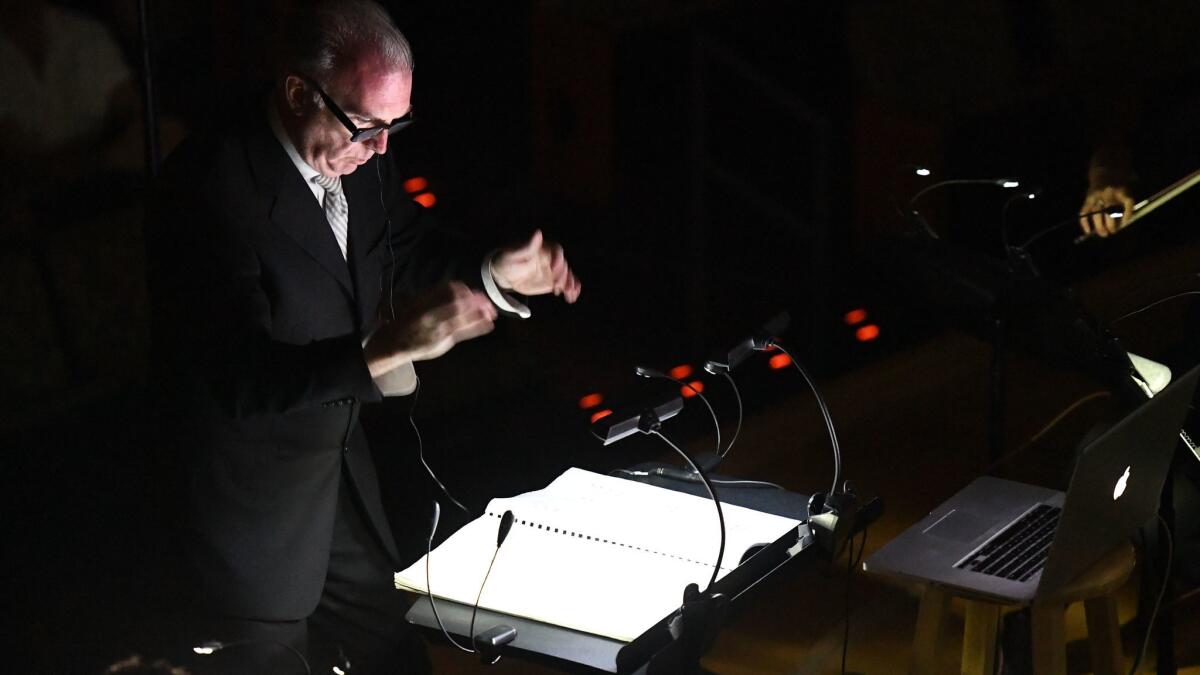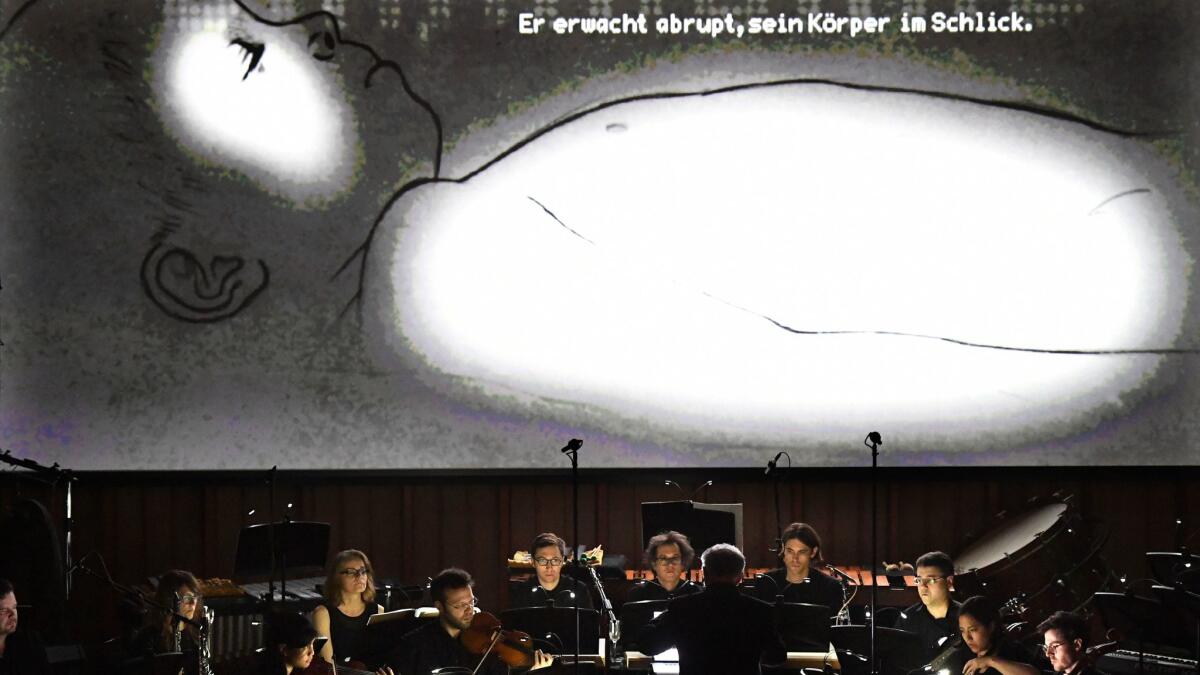Review: Why a fashionable young audience flocked to hear an obscure Greek composer’s soundscape

- Share via
Until this week, Georges Aperghis was a Greek composer never on Monday. At least never on the Monday Evening Concerts, which devoted its last concert of the season to him.
Born in Athens in 1945 and living in France since 1963, Aperghis has all the qualities of an aging European avant-gardist increasingly irrelevant to a fashionable world in which people dance to a backbeat, demand that movies have plots and base businesses on the proposition that cellphones have reduced attention spans to something that would embarrass a goldfish.
Aperghis, on the other hand, writes convoluted, incomprehensible music. He talks of questioning meaning and of twisted tracks. “Stories emerge,” is how his official biography describes his non-narrative music, “but are suddenly refuted.”
In this composer’s rarefied world, impulse overrules inhibition; cause and effect are for naïfs; one plus two equals an imaginary number. Song is not melody but the sound and fury of the head frantically coming loose from a musician’s discombobulated body.
So how’s this for twisted tracks? The Colburn School’s Zipper Concert Hall was, as has been increasingly the case with the Monday Evening Concerts, full. Many of the authentically fashionable young people in the audience looked like they had just come from shopping in Antwerp, and now they wanted music just as advanced, unpredictable and demanding as the latest striking clothes they wear.
In the two invigorating seasons that the percussionist Jonathan Hepfer has headed it, Monday Evening Concerts has become a revelatory experiment in not underestimating his public — a public that, like him, is open to astonishment.
Few could have known much about Aperghis. (Who outside of France can?) The composer has written operas and all kinds of vocal and instrumental pieces, but in searching The Times’ archives I came up with but four short Aperghis pieces that have been done locally since 1973. A few recordings can be found, but they don’t do him justice. Hepfer, who is an enthralling performer, is quickly building trust, however: If he’s interested in something, it’s bound to be interesting and the performances can be counted on to thrill.
Monday’s program began with the four-minute 1993 film “La Tête” by Jean Baptiste Mathieu, which did a fine job of introducing a composer who certainly needs an introduction. It shows the director’s head in such frenetic motion it looked about to explode. The soundtrack is of Aperghis singing exploding-head music.
In his program note, Hepfer described Aperghis’ solo percussion piece “Le Corps á Corps” as “a schizophrenic melodrama,” and he turned it into a schizophrenic tour de force. Playing a zarb, a Persian drum (and also the name of a Pakistani warhead), Hepfer was a percussionist at war with himself as he fluttered on the drum while reciting a surreal French text about a motorcycle racer losing self-control.
Sometimes the drum acted as a therapy tool for the vocalizing drummer. Other times it disrupted thought. The film’s image of a head disconnecting from the neck wouldn’t go away. As for Hepfer’s performance, the only possible response was: How did he do that?

The big piece of the evening was “Happy End,” dazzlingly performed by the Talea Ensemble from New York, with Hepfer joining in and James Baker conducting. Aperghis takes as his impetus (if you want to call it that) Charles Perrault’s fairy tale, “Tom Thumb.”
Aperghis’ strange ensemble here includes three percussionists, electric guitar, pairs of synthesizers, violins, cellos and clarinet, with a lone flute and bass. There is an intricate multichannel electronic soundscape, with some spoken text in English and French, allusions to Tom and his breadcrumbs and the ogre, but just allusions, nothing concrete. An animated film by Belgian artist Hans Op de Beeck goes from abstraction to more unhelpful allusions to Perrault and back to abstraction.
Mainly, though, “Happy End” is a roiling hour of instrumental and electronic music, dense in texture, ever changing like the sea is ever changing, mostly under the surface. The instrumental colors are so dazzling as to drive a synthesiast to distraction. There was nothing to do but follow Aperghis’ inspired twisting and twisted tracks where ever they might lead and not ask why. I overheard more than one person describe it afterward as an acid trip.
The new generation in the hall gave “Happy End” and the Monday Evening Concerts season a happy end. Lingering in the not especially inviting Zipper lobby, they let a special experience from a series, begun in 1939 and newly revitalized, sink in. I know nothing like it.

ALSO
L.A. Phil lives up to the hype with electrifying guest conductor David Robertson
Sigur Rós rocks the L.A. Phil in the name of Reykjavík
Reykjavík Festival begins with music of the Earth and singing in teacups
More to Read
The biggest entertainment stories
Get our big stories about Hollywood, film, television, music, arts, culture and more right in your inbox as soon as they publish.
You may occasionally receive promotional content from the Los Angeles Times.











